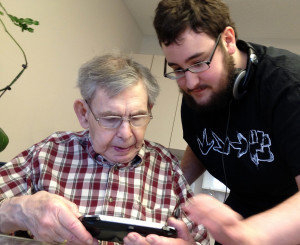April and Albert live in Calgary, and one day they debated which of them could get a parcel to a friend in Vancouver the fastest. Albert challenged April to a race. At noon they were to each set out to get a parcel to the friend and they were not allowed to use any commercial transport. Albert thought he was a sure winner since April didn’t drive. He to ok off in his Mazda Rx 8, glad for a chance to take it out on the highway. When he got to Vancouver, nine hours later, the friend had April’s parcel in hand. He thought April must have cheated, but the friend explained what happened. April knew someone who often commuted by plane between Calgary and Kelowna. This friend left Calgary’s Springbank Airport at 12:45 p.m. and arrived in Kelowna about 3:00 pm. Another friend commuted by plane regularly to Kelowna from Vancouver, and he took the parcel with him when he left Kelowna at 4:30, getting to Vancouver at 6:00 pm. A third friend picked up the parcel at the airport and delivered it to its destination 30 minutes before Albert got there.
ok off in his Mazda Rx 8, glad for a chance to take it out on the highway. When he got to Vancouver, nine hours later, the friend had April’s parcel in hand. He thought April must have cheated, but the friend explained what happened. April knew someone who often commuted by plane between Calgary and Kelowna. This friend left Calgary’s Springbank Airport at 12:45 p.m. and arrived in Kelowna about 3:00 pm. Another friend commuted by plane regularly to Kelowna from Vancouver, and he took the parcel with him when he left Kelowna at 4:30, getting to Vancouver at 6:00 pm. A third friend picked up the parcel at the airport and delivered it to its destination 30 minutes before Albert got there.
We live in a society that lifts up independence and freedom as treasured goals. In reality, for as long as people have walked on this planet, interdependence and relationships have provided the keys to survival and success.
The best of these relationships are our holy connections, which feed and nurture our spiritual lives. The story from the twelfth chapter of John’s Gospel, when Jesus visits his friends in Bethany and Mary anoints Jesus’ feet with expensive perfume, points to a holy connection.
Mary’s relationship with Jesus so richly transformed her life that her extravagant act with the perfume became a way to give thanks for how she had been blessed. Extravagant acts reveal the importance of a relationship. Fishermen abandoned their nets and families to follow Jesus. Ordinary people faced martyrdom in proclaiming their faith. Communities built immense cathedrals of incredible beauty. And the extravagance continues.
Friends of ours recently sold their acreage and his electrical business to become involved in community development in Bolivia, taking their teenage children with them. Their encounter with the sacred through a mutual friend was so intense, anything less would not have been enough.
As Christians, we are called to proclaim Jesus, crucified and risen. Mary proclaimed Jesus as the source of new life through her extravagant act. My friends proclaimed Jesus by their extravagant exchange of their comfortable Canadian life for a life working with the poorest of the poor in another country.
The extravagance and the proclamation do not happen until there is an experience of the sacred strong enough to demand nothing less of us, a holy connection that overwhelms us.
I’ve noticed that a common pattern for institutions is that they begin with an experience in a community. Over time the story of that experience becomes the centre of the institution, and then rituals and rules are created to protect that story and maintain the institution. And then, so often, the institution begins to shrivel up.
Institutions, organizations, and communities that are able to persist do so by re-experiencing the initiating experience. Sometimes the re-creation or remembering of that experience is highly ritualized and carefully nurtured. The Jesuits are the largest Catholic order because of their persistent requirement for nurturing the spiritual routines and exercises that are core to their order. This keeps their members grounded in the original experience created by their founder, Ignatius of Loyola.
This same kind of perseverance is also seen in the qualities of Pope Francis, who clearly has never forgotten that he is an ordinary human empowered by the Spirit to do extraordinary things. The outward signs of his holy connections – his extravagant refusal to accept unnecessary trappings of his position, and his persistent identification with service to the poor – are a source of great hope to many.
So where are your holy connectio ns? What new thing is God doing in your life? To what do you need to pay special attention?
ns? What new thing is God doing in your life? To what do you need to pay special attention?
One set of holy connections is our personal relationships – friends, family, and others who cross our path. We need to be alert in our conversations to little comments about needs or shifts in personal priorities. God has this annoying habit of sometimes communicating with us in rather oblique ways, and, if we are not alert, we can miss the message. For example, a few people have quit coming to my church due to hearing loss. If we value our connection with those people, we will take notice and find a way to help them hear what is going on in our church services.
Individually, reading the Bible, praying, and choosing to serve others can provide holy connections. I recently read an article that described five kinds of Christians. One kind finds connection with God through the sacraments; another through quiet contemplation; a third in charismatic experiences; a fourth through helping the marginalized; a fifth through evangelization. For all of them, the connection they experience brings comfort and strength.
Our traditions can be a holy connection or a barrier to connection, depending on whether we reach for God through them, or look to them in place of God. As a congregation, one hopes that our sharing in worship may be a source of holy connection to one another, and to God and His intentions for us. But perhaps we should ask ourselves, is worship a path for us, or a destination?
We can also find holy connections by forging links with our own wider church community, or other congregations of various denominations, and even other faiths.
We may experience holy connections through social activism or even political activism. Tommy Douglas gave his life in his quest for justice for all, because his relationship with Jesus demanded nothing less. Martin Luther King, Jr. gave his life to confronting barriers to righteousness. Mother Teresa gave her life serving the poorest of the poor.
Sometimes these connections are thrust upon us when our lives are ripped open by unexpected circumstances. Sometimes holy connections result from our deliberate willingness to seek them. Our success in establishing these connections creates sets of relationships that give us surprising capacities to do things that we couldn’t do on our own, like April in my opening story.
May God help each of us – and all of us together – to develop the holy connections we need to experience the fullness of our humanity.
You can connect with Jim on Facebook and sometimes find him on WonderCafe2, an online forum for discussion of spiritual topics, moral issues and life’s big questions.







